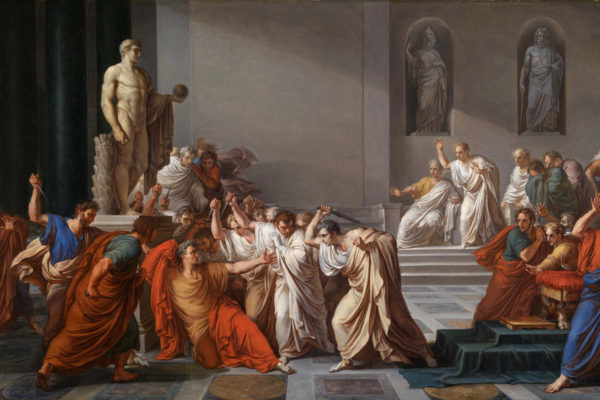“Beware the ides of March!” This expression is familiar to many of us because Shakespeare used it in his tragedy “Julius Caesar,” named after the famous Roman general and politician who was once the most powerful person in the world.
Its warning is one all Americans would do well to take to heart in today’s troubled and confusing times.
The ides of March in question was March 15, 44 B.C. More Americans ought to think through how long we can tolerate disruptions to the functioning of our federal government, put off upgrading our aging transportation and water supply infrastructures, live with ever-widening gaps between the relatively few haves and the many have-nots, support an economically and humanly costly forever war on terrorism fought by 1 percent of our population, ignore the splintering of information so that there is no common basis for informed and respectful public debate, and attribute our problems to immigrants, illegal and legal. We are calling out, with guidance from Shakespeare and Roman historians, “American citizens, beware the ides of March.”
This is no trivial matter, as we can see by using as an example Julius Caesar, a savvy and courageous public figure and an accomplished military leader who makes Dwight Eisenhower, Lyndon Johnson and Karl Rove look like amateur politicians.
In the second scene of Shakespeare’s play, during the public celebration of Caesar’s greatest triumph, a soothsayer — truth-teller — shouts out his warning from a tumultuous crowd. Caesar asks who this man is. Brutus, a close associate who we know will later help assassinate Caesar, explains the “soothsayer bids you beware the ides of March.” Wanting confirmation, Caesar has the soothsayer brought face to face. We hear for a third time within seven lines of the play, “Beware the ides of March.”
Shakespeare wanted this warning to stay with us as we watch the political maneuverings of Caesar’s rivals and the miscalculations that the shrewdly intelligent Caesar makes that will soon cost him his life. But the self-serving actions taken by all of Rome’s leaders and by the people who supported their different factions would lead to increasing violence and bloodshed across the known world and, within a few decades, to the end of the Roman Republic.
Fifteen years earlier than the action of Shakespeare’s play, Caesar passed land-grant legislation designed to bring relief to Roman military veterans and the urban poor. As University of Texas at Austin alumnus and historical writer Philip Freeman puts it, Caesar’s bill brought “enormous benefits to Roman citizens,” and it “cost the Roman treasury not a single denarius.”
The strong objections of old-guard Roman aristocrats against the bill and the political chicanery they used to try to block it were based on political self-interests and aimed at keeping Caesar from increasing his popularity and power base.
Caesar’s situation in 45 and 44 B.C. even in antiquity stood out as a case study of the pitfalls of power politics. After defeating his rival Pompey’s army at the Battle of Munda in Spain on March 17, 45 B.C., Julius Caesar was named dictator, a title given to a leader in times of emergency. He is at the height of his power and popularity. He is not about to have a soothsayer with no political power or economic influence affect his life with a prophetic warning. So, Caesar dismisses it: “He is a dreamer; let us leave him: pass.”
Caesar’s inattention cost him his life. One ancient source calculates that more than 80 conspirators were planning Caesar’s assassination. His opponents were senators who no longer ruled for the common good, if they ever had. They were joined by those who had grown rich with the support of senators and other government officials. They wanted their power and prestige back. They assassinated Caesar three days before he was scheduled to lead the Roman army to wage war against the Parthians in what we now call the Middle East.
Our lives continue to suffer under complex problems that self-regarding political leaders refuse to solve. Let us at least heed the ides of March.
Tom Palaima is a professor of classics at The University of Texas at Austin.
Al Martinich is a professor of philosophy at The University of Texas at Austin.
A version of this op-ed appeared in the Houston Chronicle, Waco Tribune Herald , San Antonio Express News, Abilene Reporter News, and Psychology Today.




